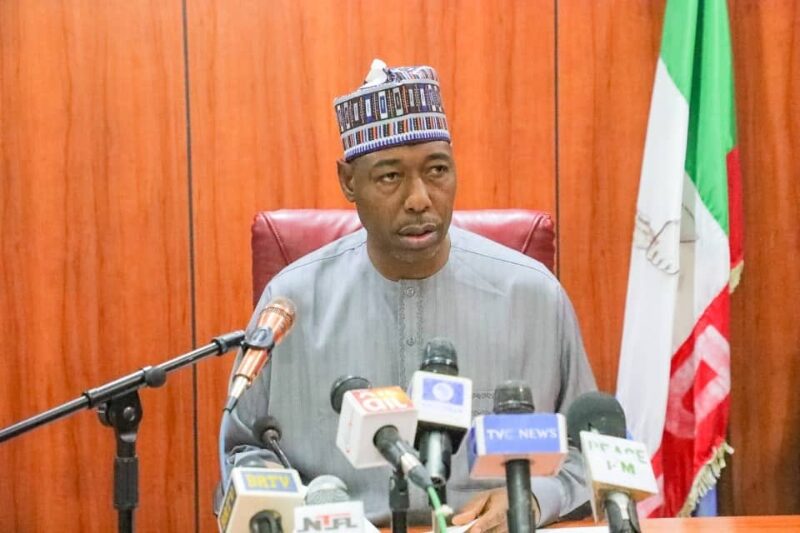Following the recent spate of attacks on farmers in Borno State, governor Babagana Umara Zulum has reiterated his commitment to collaborate with the Nigerian Army and other security operatives to increase safer access to farmlands.
He said now that the rainy season had begun, farmers were particularly vulnerable because their lands were mostly isolated and they were soft targets for criminals and insurgents.
Zulum stated this on Friday, June 23, during a visit to Keleri, a town on the outskirts of Maiduguri, the state’s capital, along the Maiduguri-Mafa-Dikwa-Gamboru highway.
He was responding to the killings of eight more farmers by suspected Islamic State West Africa Province (ISWAP) insurgents in the villages of Shuwari and Tomsu Ngamdu, as well as to the abduction of farmers in Baram Karauwa and Muna villages, all in the Mafa Local Government Area.
Zulum was addressing a large group of farmers who were waiting at a military roadblock to get clearance to access their farmlands.
Posted on his official Facebook page, Zulum said: “We [our farmers] had access [to their farmlands] in 2020, 2021 and 2022, I see no reason why we can’t have access to our farmlands in 2023.”
He said there had been a great improvement in security this year.
“I will see the military command and, insha’Allah, we will discuss [the issue of attacks on farmers] and come up with a strong mechanism that will allow farmers to safely cultivate their lands and we will also deal ruthlessly with some of the miscreants harbouring around the metropolis and its environs.
“Farming is very important to all of us; food insecurity is the worst form of insecurity. Therefore, we will not allow food insecurity to surface in this part where we have started to witness a substantial return of peace and stability.”
Zulum reassured the farmers of the government’s commitment to improving security around farmlands by using more agro-rangers to protect farmers from “miscreants perpetrating criminal activities on soft targets”.
He called on all citizens to be resilient and conscious of the happenings around them and to report any suspicious activity to security operatives. He urged people to fully support and cooperate with members of the military and other security agencies.
A member of the civilian joint task force (CJTF) from Tomsu Ngamdu village, who asked to remain anonymous for security reasons, said that the governor had visited the village to offer his condolences to the families of the eight farmers who were killed by the insurgents.
He said Zulum had pledged to provide adequate security apparatus, such as weapons and patrol vehicles, to CJTF members and other local security operatives so that they would be able to safeguard the farmers and their lands.
“I hope the government will fulfil its promise so that we can protect our people’s lives and property without the hindrance of too few weapons and patrol vehicles.”
Farmers from the villages of Muna, Tomsu Ngamdu, Baram Karauwa and Shuwari told RNI that they were highly concerned about the attacks and were extremely fearful about going back to their lands, even though they had to go so that they could provide food for their families and sell their produce.
“The deadly attacks on our fellow farmers and on firewood collectors have terrified us and we are scared to go to our lands.”
Bagoni Modu, a farmer and a displaced man taking refuge at the Muna internally displaced persons’ camp, said the insurgents killed the eight farmers who had gone to the forest to cultivate their farmlands and collect firewood on Thursday.
“One of my brothers was among the people who were killed. The security operatives discovered the corpses of the slain farmers in the forest at about 8pm. They brought the bodies back to us and we buried them on Friday at about 9am. The vicious and deadly attack has really frightened us and we are scared of going back into the forest. We all know that we could be the next ones to die,” Modu said.
Modu Ali, a farmer from Tomsu Ngamdu, said five of the eight farmers who were killed were from Tomsu Ngamdu village. The other three victims were from Shuwari village.
“The insurgents also abducted some farmers from Baram Karauwa and Muna. We are living in fear. We urgently need the government to provide stringent security measures to protect us because farming is vital to us. That’s how we make a living and put food on our tables.”
At least 25 farmers have been killed since the start of this year’s rainy season. Apart from the eight killings in Mafa, 15 farmers from the Molai community of Maiduguri were found beheaded on Thursday, June 15. Many farmers were still missing.
Residents said they did not know if the missing farmers were being held captive for ransom or if they were also killed.
The gruesome attack, in which the armed men, suspected to have been insurgents, used cutlasses and knives to behead the farmers, took place in broad daylight at about 12 noon.
Two charcoal makers were slain in the same way and were found beheaded in a forest 15km from Damboa on Tuesday, June 20. It is suspected that the internally displaced persons were slain by members of the Jamā’at Ahl as-Sunnah lid-Da’way Wa’l-Jihād (JAS), more commonly known as Boko Haram.
The two men had gone to the forest to cut down trees to make charcoal which was their only means of making a living.
A resident of Damboa town said: “The vicious attack happened at about 12pm in the nearby forest about 15km from the town. The Boko Haram [JAS] insurgents tied up the innocent farmers before slaughtering them like animals by cutting off their heads. We had been searching for the men for a while when we found their corpses in the forest. We buried them there.”
SHETTIMA LAWAN MONGUNO








